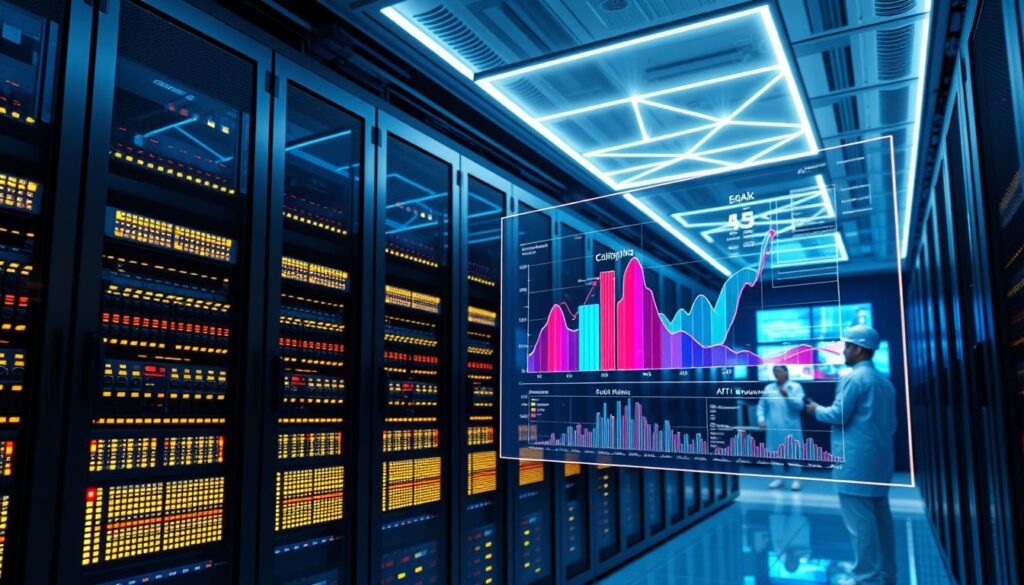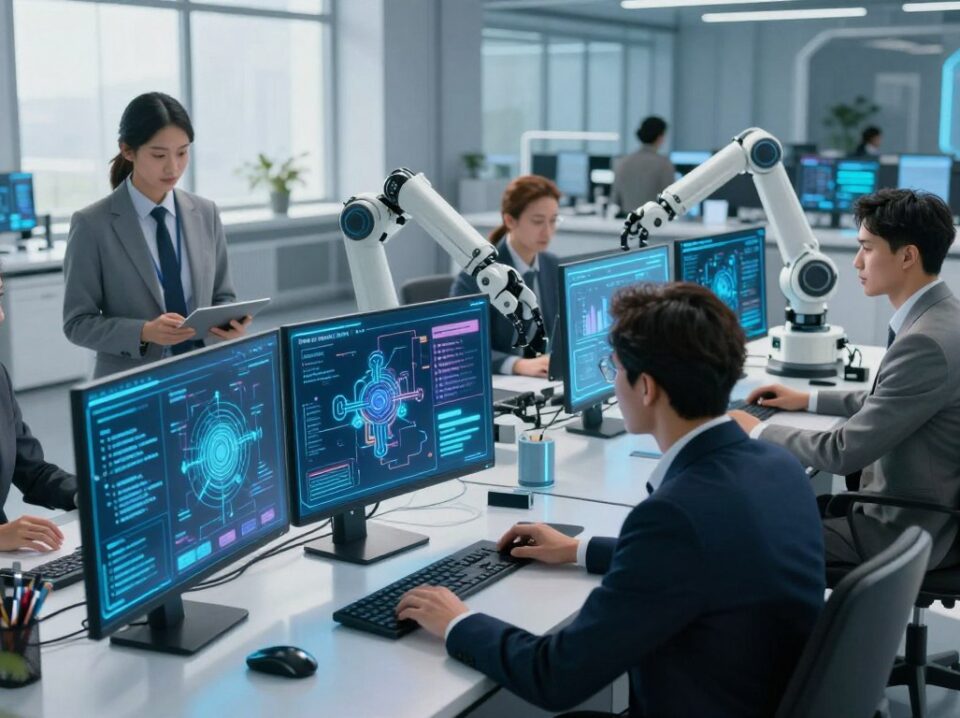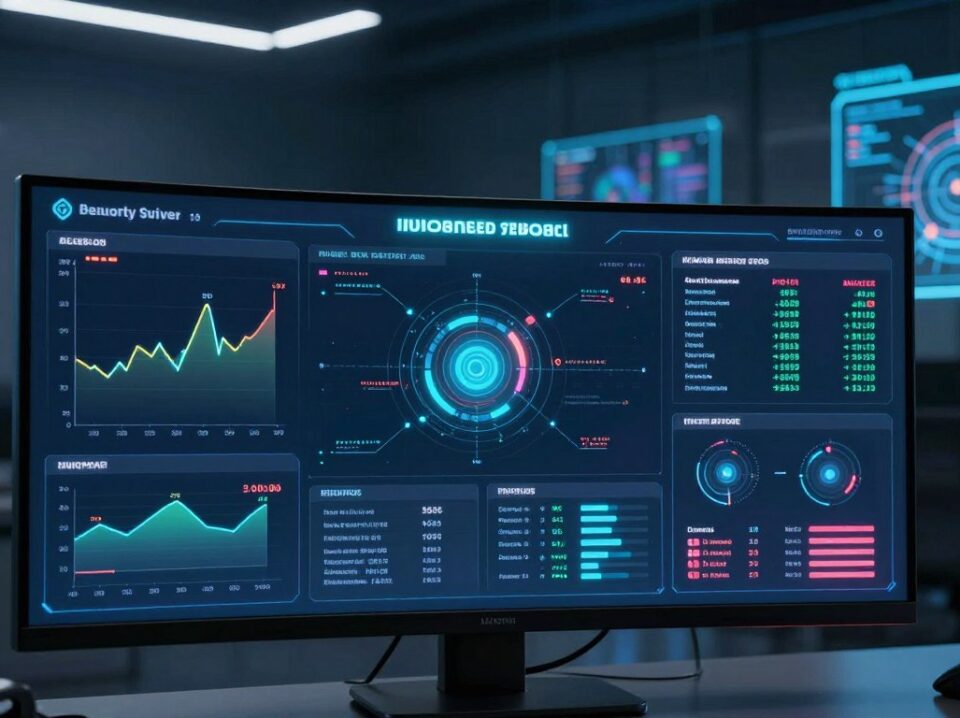More than 80% of companies say their AI operations (AIOps) aren’t keeping up with today’s digital world. This shows a big problem in how we manage IT operations that needs to be fixed fast.
We’re at a turning point in tech. Old AIOps solutions can’t handle the complex digital world anymore. Cloud tech, microservices, and distributed computing are changing too fast for current AI to keep up.
Our research shows AIOps isn’t enough anymore. Today’s tech world needs a smarter, more flexible approach. Companies must update their IT strategies to stay ahead and strong.
Key Takeaways
- AIOps solutions are struggling to manage modern complex IT infrastructures
- Traditional monitoring approaches are becoming obsolete
- Intelligent, adaptive IT operations are key for business success
- Next-generation AI must blend proactive and reactive strategies
- Continuous adaptation is essential for effective IT operations management
The Evolution of IT Operations Management
The world of IT operations has changed a lot in the last ten years. Our digital lives need smarter ways to manage complex tech systems. As companies face the challenges of today’s IT, they need clever solutions.
Old IT management was slow and relied on manual work. Techs spent hours watching systems, finding problems, and fixing them. This method was not good for a world where tech is growing fast.
Emergence of Intelligent Solutions
AIOps changed IT operations for the better. These smart tools aim to make managing systems easier and more efficient.
- Automated incident detection
- Predictive analytics
- Real-time performance optimization
- Reduced human intervention
Market Adoption Trends
Companies are quickly adopting AIOps to solve old monitoring problems. Our studies show some interesting trends:
| Industry Sector | AIOps Adoption Rate | Primary Motivation |
|---|---|---|
| Financial Services | 68% | Risk Mitigation |
| Healthcare | 52% | System Reliability |
| Technology | 75% | Operational Efficiency |
“The future of IT operations lies not just in automation, but in intelligent, predictive management.” – Technology Innovation Journal
Even with AIOps’ progress, it’s not the full answer. Today’s IT is too complex for just AI. We need smarter, more flexible ways to manage it.
Why AIOps Isn’t Enough Anymore
The world of IT operations has changed a lot. Traditional AIOps methods are not enough anymore. They can’t handle the complexity of today’s digital systems.
There are several big problems with AIOps today:
- It lacks adaptive intelligence for tough decisions
- It can’t easily work with many different technologies
- Its predictive analytics can’t spot complex system failures
- It doesn’t have smart, context-aware responses
IT automation needs smarter strategies than old AIOps. Today’s businesses need systems that get complex situations, make quick decisions, and manage complex tech environments.
The future of IT operations isn’t about just collecting data—it’s about transforming that data into actionable, intelligent insights.
Companies must move from just watching to actively managing. They need to use advanced machine learning. This will help them understand situations better, work across different platforms, and solve problems on their own.
Our study shows that IT automation needs a new approach. It should mix human skills with smart algorithms. This will make tech systems more stable and flexible.
The Growing Complexity of Modern IT Infrastructure
The world of IT has changed a lot, making it hard for companies to manage their tech. DevOps teams face a complex network of systems. They need new ways to keep sites running smoothly.
Our digital world is getting more complex. We need strong plans to handle new tech challenges. The old ways of doing things don’t work anymore.
Multi-Cloud Environment Challenges
Managing many cloud systems is tough for companies. They face big problems like:
- Connecting different cloud platforms smoothly
- Keeping security the same everywhere
- Improving how fast things work
- Managing costs and resources well
Microservices Architecture Impact
Microservices have changed how we build and run software. They bring new challenges:
- They make it easier to develop apps
- They help apps grow and scale
- They make it easier to find and fix problems
- They make managing connections harder
Edge Computing Considerations
Edge computing is a big step forward in IT. We need to adjust to systems that work closer to where data is.
| Edge Computing Aspect | Key Challenges | Operational Strategy |
|---|---|---|
| Latency Reduction | Network Performance | Intelligent Routing |
| Data Processing | Distributed Computing | Decentralized Architecture |
| Security | Multiple Access Points | Advanced Encryption |
By tackling these challenges, companies can build better tech systems. These systems will help them keep innovating and working well.
Beyond Automated Monitoring: The Need for Intelligent Action

The world of IT operations has changed a lot. We’re moving from just watching systems to taking smart actions. Now, machine learning ops need to do more than just find problems. They should fix them on their own, with little help from humans.
Our plans for IT automation need to get better. We face new challenges in today’s digital world. Knowing how systems work and predicting problems is key to keeping business running smoothly.
- Advanced machine learning capabilities enable predictive problem resolution
- Intelligent automation adapts to dynamic IT environments
- Real-time insights drive strategic operational decisions
Today’s companies need smart systems that can:
- Automatically find and fix complex technical issues
- Offer the best ways to fix problems
- Learn from past mistakes
By combining machine learning ops with strong observability, we’re changing how we manage IT. We’re shifting from just reacting to problems to taking smart steps to prevent them.
The future of IT operations lies in systems that think, learn, and act autonomously.
| Capability | Traditional Approach | Intelligent Action Approach |
|---|---|---|
| Problem Detection | Manual Monitoring | AI-Powered Predictive Detection |
| Resolution Speed | Hours/Days | Minutes/Seconds |
| Learning Mechanism | Static Rules | Continuous Machine Learning |
Integrating DevOps with Advanced AI Capabilities
The world of IT operations is changing fast. DevOps teams are using advanced AI to change how they develop software and manage infrastructure. This change is making a big impact on how technology is deployed and managed.
DevOps and AI working together is a big deal. It helps solve complex problems in IT. By adding smart automation to development, teams can work much faster and better.
Continuous Integration and Deployment Enhancements
AI is making big improvements in how code is checked and deployed. The main benefits are:
- Intelligent code review and quality assessment
- Automated testing with predictive error detection
- Dynamic resource allocation during deployment
- Real-time performance optimization
Automated Security Response Systems
AI is helping with security by finding threats and fixing them before they happen. These systems can:
- Identify possible security risks quickly
- Automatically create and apply security fixes
- Learn from past security issues
- Stop security problems before they start
Predictive Resource Management
AI is changing how resources are managed. It gives smart, data-based insights. Now, teams can:
- Guess what infrastructure they’ll need
- Make the best use of cloud resources
- Save money on operations
- Make systems run better
As DevOps keeps growing, using AI will become even more important. It will help create smart IT systems that can handle changing tech challenges.
The Role of Machine Learning in Next-Generation Operations

Machine learning is changing IT operations management. It’s moving beyond old monitoring systems. Now, we have smart platforms that can solve complex problems before they start.
Machine learning in IT operations is powerful. It can:
- Detect small performance issues
- See when a system might fail
- Make complex decisions on its own
- Manage resources better
We’re seeing a big change. Intelligent systems now guess what infrastructure needs before we do. This makes systems that fix problems by themselves, needing less human help.
Our studies show that future AI operations will use deep learning. It will:
- Look at huge amounts of data fast
- Plan for maintenance before it’s needed
- Change network setups as needed
- Find and stop cyber threats better
With advanced machine learning, companies can make their IT systems much better. They’ll work more efficiently and be more reliable.
Building a Future-Ready IT Operations Framework
The world of IT operations is changing fast. It needs a new way of thinking that’s more than just watching and fixing things. As tech gets more complex, having a strong framework is key for lasting success.
We’re working on a new IT framework that’s ready for the future. It has three main parts that help manage technology smoothly and smartly:
Hybrid Intelligence Models
By mixing site reliability engineering with AI, we create powerful models. These models use both human smarts and machine learning. They help solve problems better and predict when things might go wrong.
- Use AI for quick decisions
- Improve visibility in complex systems
- Blend automated tasks with human strategy
Cross-Platform Integration Strategies
Today’s IT needs to work well together, no matter the tech. We’re building strategies that help break down old barriers. This makes tech more flexible and quick to adapt.
- Use standard ways to talk between systems
- Make one dashboard for all monitoring
- Build flexible ways to connect APIs
Skills and Training Requirements
For tech pros to keep up, they need to keep learning. Companies must invest in training that boosts both skills and problem-solving.
- Offer ongoing learning paths
- Support teamwork across different areas
- Get certifications for new tech
Conclusion
The world of IT needs a big change in how we use AI. We see that AIOps isn’t enough because digital systems are getting too complex. Now, we need smarter, more flexible ways to manage IT.
Our study shows that AI operations need a complete system. This system should use advanced machine learning, predictive analytics, and smart intelligence across different platforms. The future of IT is about systems that can predict problems, solve them automatically, and keep up with fast changes in tech.
IT leaders should check their current setup and look for new, better solutions. By using advanced DevOps and AI, companies can turn their IT into a key driver of innovation. This change needs dedication, careful planning, and a readiness to move away from old ways of doing things.
As tech keeps moving fast, our AI operations must be quick and smart too. The way forward requires us to keep learning, invest wisely, and have a culture that can handle the challenges of today’s digital world.
FAQ
What are the primary limitations of current AIOps solutions?
Current AIOps solutions struggle with automating complex decisions. They also have trouble integrating with new technologies and providing advanced analytics. These issues make it hard to manage today’s dynamic IT environments.
How has the complexity of IT infrastructure changed the requirements for operations management?
IT environments have become more complex with multi-cloud platforms and edge computing. These changes need more advanced management tools. Traditional AIOps tools are not enough, so we need smarter solutions.
Why is automated monitoring no longer sufficient for IT operations?
Today’s IT needs more than just finding problems. It requires systems that can fix issues and adapt to new technologies. We need advanced machine learning and automation to meet these needs.
How can DevOps practices improve current IT operations management?
Integrating AI with DevOps can improve IT operations. It helps with continuous integration, automated security, and predictive resource management. This makes IT operations more robust and adaptable.
What role does machine learning play in the future of IT operations?
Machine learning offers deeper insights and accurate anomaly detection. It can lead to autonomous IT operations that self-optimize and self-heal. These capabilities go beyond what traditional AIOps can do.
What skills will IT professionals need in this evolving landscape?
IT professionals need skills in hybrid intelligence and cross-platform integration. They must understand advanced AI technologies and work with intelligent systems. This requires a mix of technical and strategic knowledge.
How can organizations transition from traditional AIOps to more advanced IT operations management?
Organizations should assess their IT infrastructure and invest in machine learning. They should integrate DevOps and combine human expertise with AI. This requires continuous learning and strategic technology investments.
What are the key challenges in implementing next-generation IT operations frameworks?
Key challenges include managing complexity, integrating systems, and developing machine learning models. Ensuring security and upskilling IT teams are also important. Success depends on a holistic strategy that considers technology, operations, and people.




